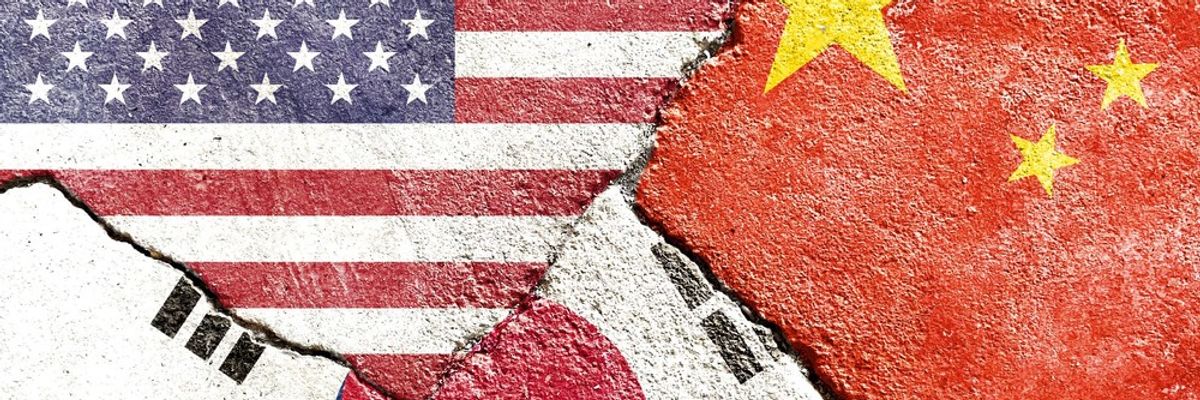Recently-retired U.S. commander in Korea, General Robert Abrams, attracted criticism from the South Korean government when he asserted in an interview with the Voice of America that new war plans with South Korea should include China as a target.
Stressing that he was speaking in his personal capacity, the General said that focusing on China was a “natural evolution” for the U.S.-South Korea alliance, which for decades has been concerned almost exclusively with the threat posed by North Korea. General Abrams also spoke of the strong resistance from South Korea to updating the war plan (the details of which are classified), before Secretary Austin succeeded in getting South Korea to reverse its opposition this year.
There’s more to the General’s remarks, however, than a freelancer speaking as a private citizen. Undersecretary of Defense for Policy Colin Kahl had hinted at something similar when he spoke recently of the U.S.-South Korea alliance going through an “evolution” and turning to “other challenges.” Parallel U.S. diplomatic initiatives in Northeast Asia have also begun to focus on China. In May 2021, the United States got a reference to Taiwan included for the first time in a joint statement from the U.S.-South Korea leaders’ summit, though the language was a bit more muted than from the U.S.-Japan summit the previous month. Specifically, the statement called for “the importance of preserving peace and stability in the Taiwan Strait.” This language was repeated in the Joint Communique from the recent 53rd U.S.-South Korea Security Consultative Meeting.
Clearly, Washington is pushing South Korea to pivot its diplomatic and military capabilities to counter China —an attempt that extends to the rest of its Asian allies and partners. However, this attempt is going much more slowly than the United States would like. The Quad was earlier seen in Washington as a lynchpin for a new containment coalition, with the primary initial goal of bringing India into the U.S. security architecture in Asia as a de facto ally. Though notable successes were achieved with India’s signing key foundational agreements that opened the door for deep interoperability with the U.S. and the expansion of the Malabar exercise (which practices China contingencies), India appears to have developed cold feet of late on taking the Quad’s China-containment activities even further.
Enter AUKUS, a much more explicit military pact between Washington, London, and Canberra aimed to arm Australia with long-range nuclear-powered submarines that could presumably be used in offensive operations far from the country’s littorals. The turn to AUKUS may have partly been due to the perceived shortcomings of the Quad. But beyond Australia, and to an extent Japan and India, the United States is struggling to enlist other Asian states such as South Korea, Indonesia, Malaysia and Vietnam in its China-containment plans.
Most of Asia generally prefers to remain nonaligned when it comes to the U.S.-China rivalry, especially its military dimensions. There are important constituencies within some such non-aligned states that are supportive of aiding the United States on China containment, but they are largely offset by others who are looking to stay neutral or even bandwagon with Beijing. In the case of South Korea, conservatives are more supportive of the sorts of recipes favored by Washington’s China containment camp, but progressives, currently in power, are clearly opposed.
Though the United States publicly claims it is not forcing countries in the region to take sides in the U.S.-China rivalry, its policies on South Korea indicate a more coercive U.S. strategy in private. China too uses coercive tactics to push for changes in foreign policies in the neighborhood. Those strategies have already led to blowback, such in the case of Australia. Also, China’s turn to such crude and counterproductive tools is typically in service of developments it sees as directly impinging on its sovereignty or security of its homeland.
For its part, the United States, with its homeland (where most Americans live) located an enormous ocean away and safe from any Chinese military action, must adopt a much smarter approach in Asia. Pressuring major states such as South Korea to take a highly consequential pivot toward China-containment will likely fail. If it does succeed in a few cases (for example, conservative candidate Yoon Seok-Youl, who is more hawkish on China, may well come to power in the upcoming South Korean election), major divisions within these states on such a high-risk pivot can lead to either allies and partners not showing up on China when the U.S. wants them to, or future blowback and increased anti-American sentiment in the region. President Biden, with his long foreign policy experience, should keep this in mind and tread very carefully.














